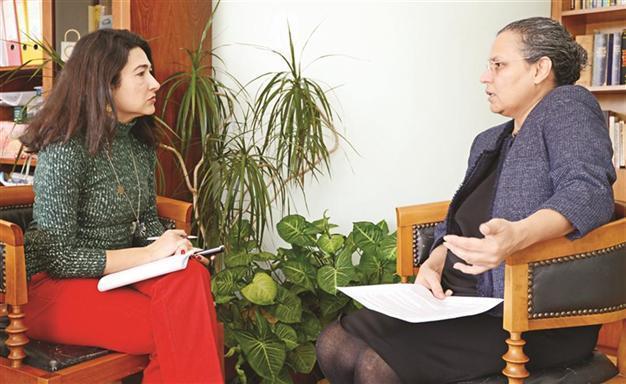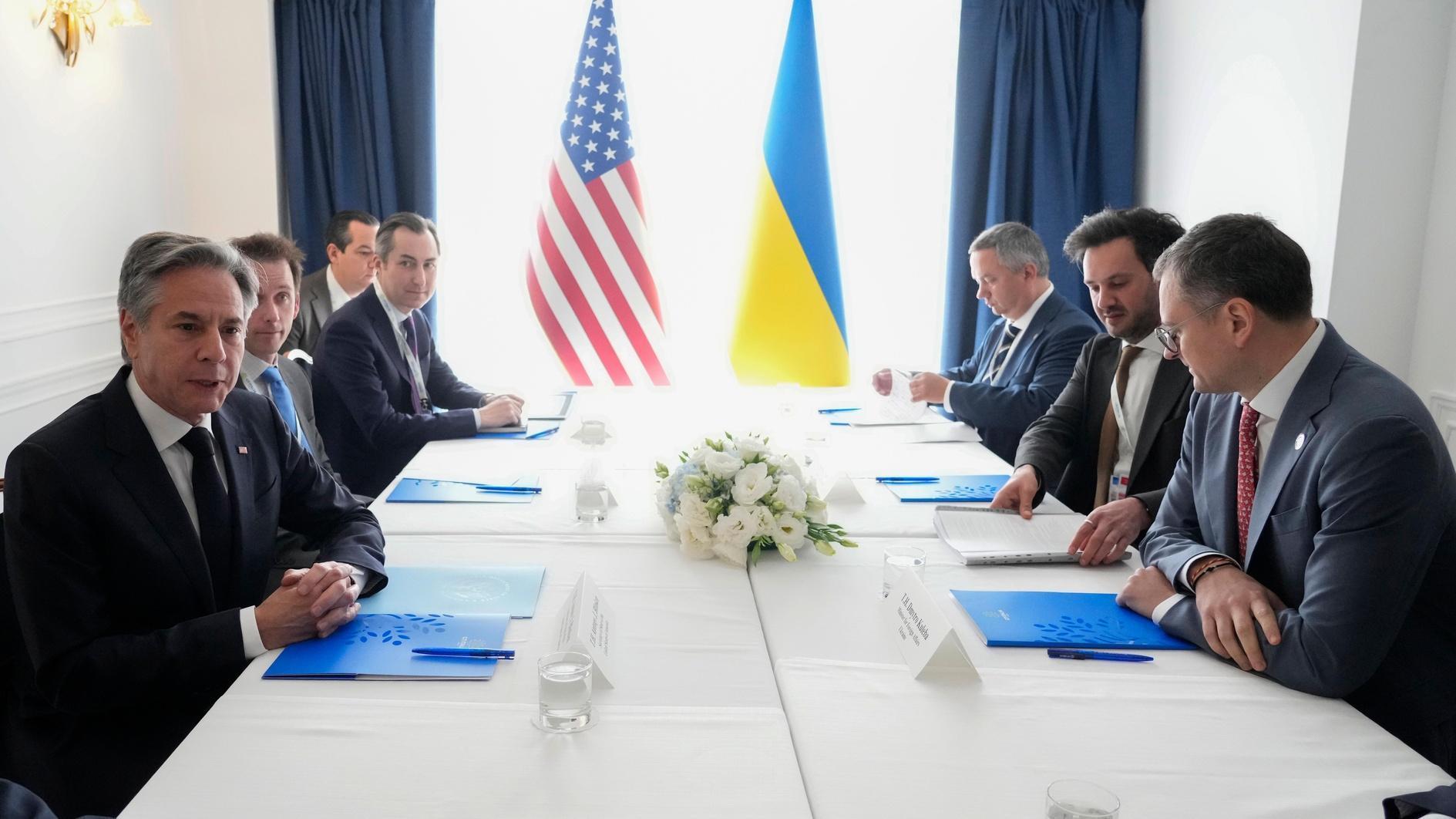AKP seeking to create own women’s movement: Lawyer
ISTANBUL - Hürriyet Daily News

There needs to be an acceptance of the fact that there is a crisis, says activist Melek Özman (R) about the increasing number of women murders. Representatives of the legislative, executive and judicial branches should convene at a crisis summit to come up with an action plan, she says, speaking at the Istanbul office of Filmmor, a civil society initiative which also organizes women’s film festivals. DAILY NEWS photos, Emrah GÜREL
The ruling Justice and Development Party (AKP) is attempting to sideline established women’s NGOs in favor of new organizations more sympathetic to the government, according to a prominent lawyer and women’s rights activist. Although the AKP’s first and second terms in power saw positive steps on gender equality, the current third term is increasingly “unfortunate for women,” Hülya Gülbahar told the Hürriyet Daily News ahead of March 8, which is International Women's Day.“A number of new women’s NGOs believed to be close to the government are being established in several cities. Governorships that used to work with well-established women’s NGOs are now working with the new ones and avoiding the old ones. This is a very recent development that is, however, growing dangerously,” Gülbahar said. “There seems to be an effort to eradicate independent management.”
Let’s review the past year in terms of women’s rights and start from the positive developments.
I don’t see any developments that make me optimistic. Throughout the rule of the Justice and Development Party (AKP) government we have tried not to go back on our previous gains. The process that led to the endorsement of the law to fight against violence against women [adopted by Parliament in March 2012] proved very difficult for us. In the past we worked together with the AKP in several legal amendments such as changes to the Turkish penal code. When the new one was adopted in 2005, 80 percent of our demands were reflected in the new penal code. But Erdoğan’s third term - described as the “mastership period” - has been one in which policies that are very unfortunate for women have started to be implemented. I have difficulty seeing any positive development when looking back at the past year.
So you think the AKP’s third tenure in government is proving to be more negative than its first two tenures in terms of women’s rights?
The prime minister has openly said he does not believe in equality between men and women. Previously, there was no questioning of the principle of gender equality. During the AKP’s first tenure, the Turkish penal code was amended and there were no signs or rhetorical indications that there could be policies that might step backward. Then, in 2007, we came face to face with a draft Constitution that considered women to be a group that needs to be protected like children or the elderly. Then, the third AKP term started out by removing the term “women” from the relevant ministry. By the way, I have just recalled that Turkey was the first country to ratify the Council of Europe’s convention against violence against women [in late 2011]. This is very important, but Turkey only signed this convention to improve its image abroad. It has zero political will to transfer the convention’s stipulations into national law. So the convention is signed but it isn’t implemented. The government rejected our demands for the convention’s stipulations to be endorsed in the new law about violence against women.
Discussions are continuing as to whether there is a real rise in violence against women, or whether it has just become more visible.
Between 2002 and the first seven months of 2009 there was a 1,400 percent rise in the number of murders of women. That means that five women were killed per day in 2009, according to official numbers. However, since that day we have not been able to access official statistics, as they are not being released. I don’t believe murders of women are diminishing; on the contrary they are continuing to rise.
Why so?
There are several factors. Among them are migration, poverty, unemployment, nationalist rhetoric, and the fact that the rights provided by the social state are being curbed.
How come? More women than men support the AKP, and some are doing so because of certain financial support that they have started to receive from the state.
Financial support is provided in a way that keeps women at home. Why should women get financial support to take care of the elderly at home? Or maybe there is a tax exemption for those women working from home. Financial support seems to be conditional on women staying at home.
Meanwhile, the rise in conservatism is also a factor in the rise in violence against women. The rhetoric that sees the main mission of women as being motherhood also plays into the rise in violence against women. There is also a rise in women’s awareness; more women are seeking not to accept traditional roles, while men are holding on to them.
What do you think about the implementation of the new law on violence against women?
I am very sorry. Actually, I am not that pessimistic in general, but I am very worried about women’s rights in Turkey. There is a sort of “women opening,” but in a reverse sense - we might call it a “women closing”! This is a very special period. I can almost say that the government has sort of started an operation against women.
That is a very striking claim. What makes you say that?
It is striking indeed, and I would really like to be proven wrong. The challenging of gender equality in the 21st century is really disastrous, but I think there is an operation against the concept of gender equality. For example, concepts that were meant to raise awareness on gender equality in educational materials prepared by the government for public servants were removed. Last summer, the parts aiming to raise awareness about gender equality in seminars were cancelled. Last year, 11 centers for the prevention of violence, [called ŞÖNİM], were opened, as foreseen in the law. But there are no groups with experience in these centers. The experienced elements of the SÇHEK [social services and child care association] were all sent away. We have been working with these for the past 15 years, and this was a huge blow to the women’s movement. NGO rooms are being opened in ŞÖNİMs, but these NGOs need to be accredited by the Family and Social Policies Ministry. For this purpose, a number of new women’s NGOs believed to be close to the government are being established in several cities. Governorships that used to work with well-established women’s NGOs are now working with the new ones and avoiding the old ones. This is a very recent development that is, however, growing dangerously. There is a wish to bring the shelters or consultation centers of the municipalities and women’s organizations under the control of the ministry. It seems to be an effort to eradicate independent management.
We know that female imams are asked to go to shelters, but shelters need to be kept secret and not everybody should have the right to go to them.
The members of a women’s consultation center in Mersin were taken into custody within the framework of the KCK cases. A closure case has been opened against Va-Kad, the women’s association of Van, within the framework of KCK. Va-kad is one of the most important institutions of the Turkish women’s movement, and we have been working together with it for year. It has no relationship to the PKK [the outlawed Kurdistan Workers’ Party] whatsoever.
These are concrete facts that demonstrate that a policy aiming to marginalize independent women’s movements in Turkey is being implemented. The Turkish women’s movement is very respected worldwide, but the current picture shows us that it is at risk. I know that I am using very harsh rhetoric. There is also an intention to privatize some of the services provided by the ministry, so that these services are only provided by certain NGOs accredited at the ministry. This may have very controversial consequences.
How about Family and Social Policies Minister Fatma Şahin. Many voiced satisfaction when she was appointed as minister.
I am among those who believed she was the right choice. However, the ministry under her has not proved to be successful and the increasing conservatism of the government’s policies on women plays a big role in this. She cannot do the work she wants to do and can’t work with the elements that she wants to work with. There is a tremendous pressure on her not to be so involved in women’s issues.
So, do you claim that the AKP is trying to create a pro-government alternative women’s movement in Turkey?
It looks like it, but this is really very new and we will see how it proceeds. The prime minister wants to set the women’s format that he has in his mind; I could almost say that he monitors women’s issues as closely as we do. But it is not so easy to break the women’s movement through divide and rule policies. I have to say that in many issues we are also continuing to work with AKP officials and have very close relations with them.
Who is Hülya Gülbahar?
Hülya Gülbahar currently works as a lawyer in Istanbul. She is one of the representatives of the Women’s Constitution Platform and was the chairperson of the Association for Supporting Women Candidates in Politics (KADER) between 2007 and 2010. She worked as a lawyer in a number trade unions and also worked in the publishing sector, editing encyclopedias and trade union publications.
Gülbahar volunteered at the Purple Roof Women’s Shelter Foundation and has been a member of this collective for over 10 years. She is a founding member of the Women’s Congress e-List and the Women’s Media Watch Group. She continues her work in law as a founding member and spokesperson of initiatives such as the Protection Order Women’s Platform, the Civil Law Women’s Platform and the Turkish Penal Code Women’s Platform. In October 2012 she was awarded the “Human Rights Honor Award” by Istanbul University’s Faculty of Law.
















